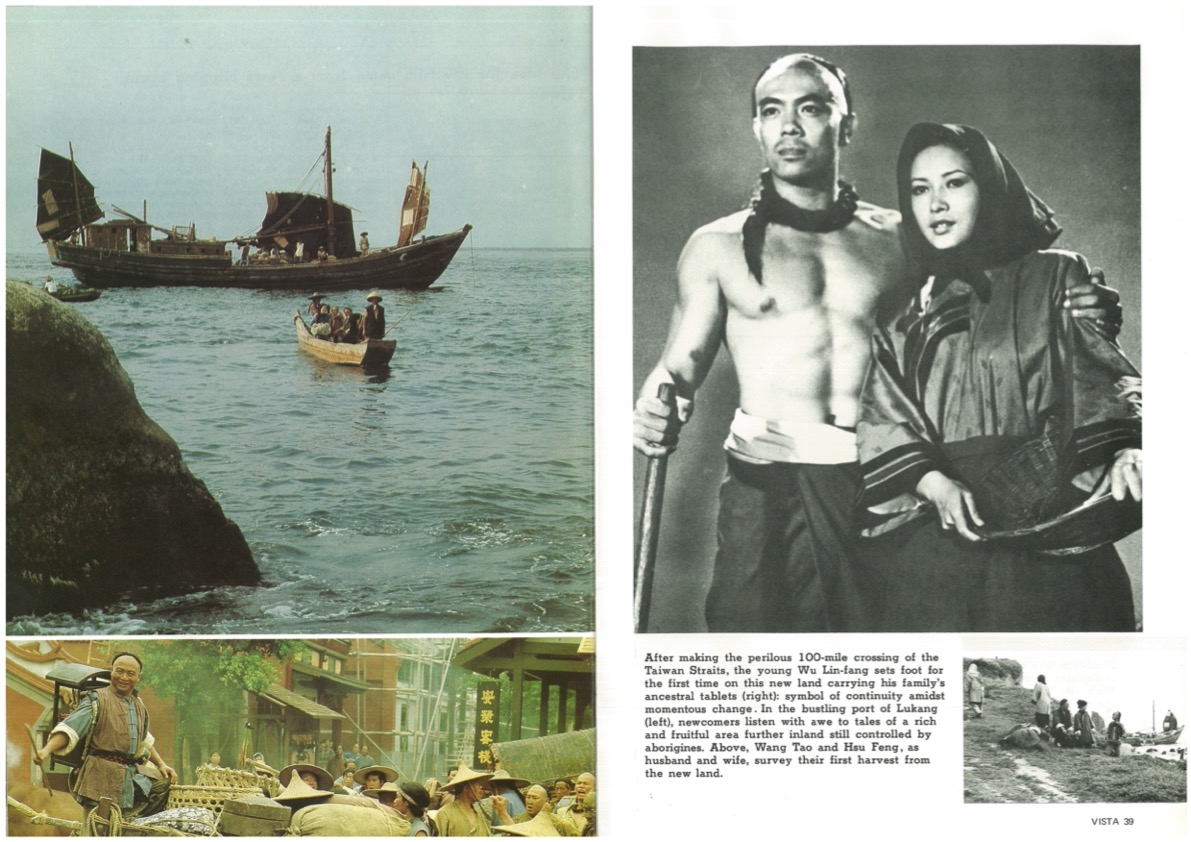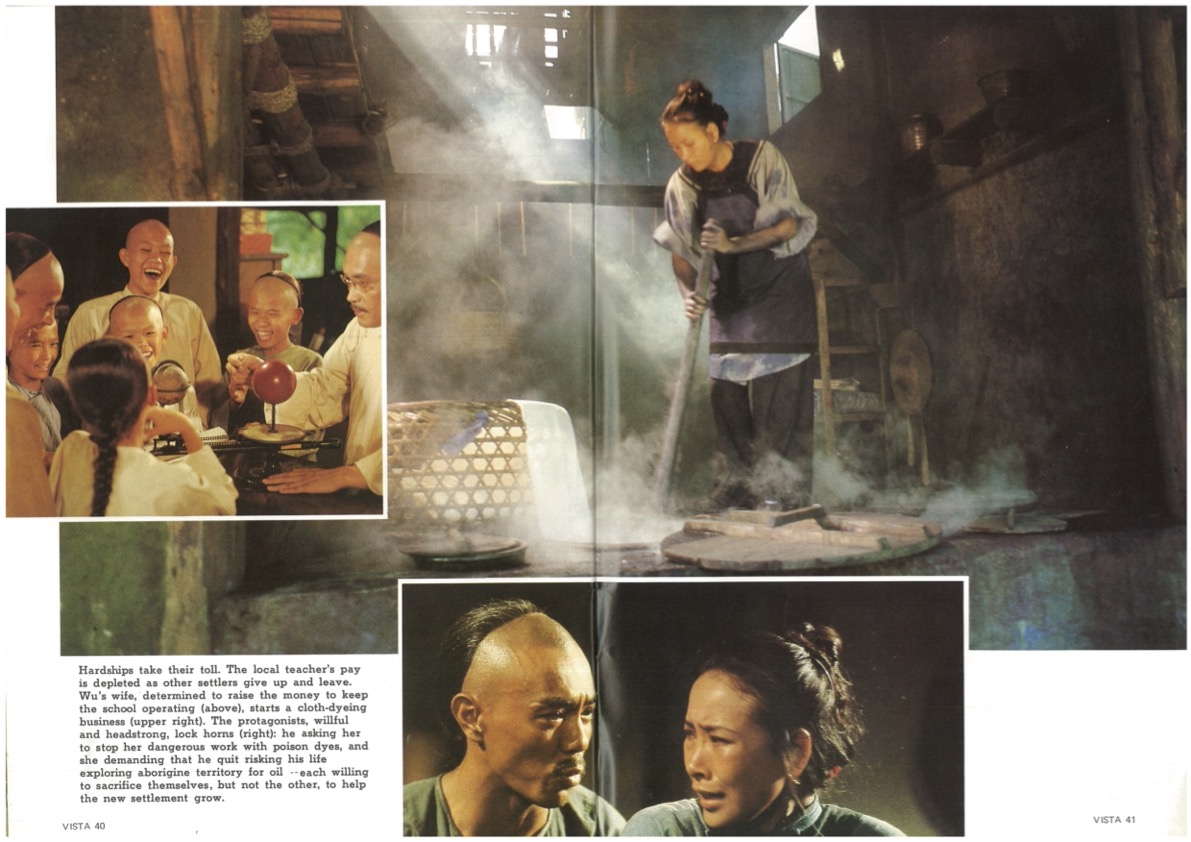Oil! Since ancient times a source of wealth and fascination, and now the subject of the most ambitious and most expensive film in Chinese history,”The Pioneers. Set against the background of the struggle of Taiwan’s early settlers to forge a new life in this often hostile land. “The Pioneers” tells the story of the historical Wu Lin-fang (above ). Leader of a group of pioneers, Wu devotes his life to developing this resource from a spectre which terrifies his fellow settlers to the beneficial helper which provides them with fuel and light.
Wang Tao gives a masterly per-formance as Wu Lin-fang, por-traying his character from the age of 19 to well into his 60s with great conviction. Hsu Feng stars as his faithful wife. Born into a wealthy family in the city,she is driven by fate and her love for Wu to endure the hardships of a pioneer in the mountains. She is the ROC’s best known intermationa,actress havine, stan won the prize for technical excel- lence at Cannes.
John Philip Law and Deborah Zon portray American oil en- gineer, A. P. Karns, and his amorous companion who arrive to help construct the oil well and manage to perplex and amuse the Chinese, while mutual respect and affection grows between the representatives of the two cul-tures.
No effort or expense was spared to give “The Pioneers” as much authenticity as humanly possible. The entire main street of a traditional town was con-structed, and costumes and props were meticulously researched by a team of top scholars. Hsu Feng’s gowns, for instance, are all madeof vividly hand-embroidered silk, the designs for which were faith-fully copied after antique origi-nals.
Specialists from many disci-plines were called in by Director Richard Chen to augment the skills of the large production staff. Four separate wells had to be constructed. all in different styles. To make them truly re-flect the technology of the day, ateam of 20 specialists from the China Petroleum Company spent five months constructing them,including one well based on de-signs in an old Ming Dynasty text.
“The Pioneers”is indeed a new departure for Chinese film-making. Not only is the first truly international production made in Taiwan, but its use oflocal historical material also rep-resents a fresh approach.
And its reception by the people of Taiwan has been overwhelm-ing. In the first month at the box office, it has already earned back70 percent of its production cost.
“The Pioneers” has not only achieved new heights in Chinese cinema, opening new vistas to the further development of this art, but it has also made history live for millions of people in Tai- wan, giving them a new pride intheir roots here. With this film it may be said that the Chinese cinema has come of age.
“This is the story of one man’s dream of helping his fellowmen, and his determined effort to overcome all obstacles to its realization. We felt this would be a good example for people today
VISTA: This film represents a signi-ficant departure from the more usual genres of Chinese film-making. How did the idea for making “The Pioneers” come about?
CHANG: Five or six years ago,while I was in charge of Central Mo-ton Picture Company’s production department, everybody was talking about the oil crisis. I thought it would make a great idea for a film, and had one of my people look into the possibility of writing a script on Chinese oil drillers working in Saudi Arabia. This idea fell through, how- ever.
Then three years ago, when I was working with Director Richard Chen on another CMPC film, we came upon the idea for “The Pioneers.” Richard had seen a news clipping about the oil wells in Miaoli – how a man named Wu Lin-fang 150 years ago had dedicated his life to finding oil in the area and thought it would make a great story for a film. I liked the idea and not long after he brought script- writer Chang Yi in to talk with me.
We agreed that Chang would quit his job at an ad agency to devote full time to researching and writing the story. It was carried in serial form in the paper and eventually published as a novel before we started working on the filmscript it-self.
VISTA: What was it about the story that encouraged you to go ahead with such an ambitious proj-ect?
CHANGS: First of all, it was the story of one man’s dream of help- ing his fellow men, and his deter- mined effort to overcome all ob- stacles to its relization. We felt this would be a good example for peo-ple today.
Also, the story itself has great cinematic interest, with many strik- ing visual scenes including a flaming river, an oil well that explodes after being hit by lightning, and a violent earthquake. This provided quite challenge to the special effects crew, and a great opportunity to learn. We called in a top Japanese team and sent more than halt a million dollars on these effects alone.
The film also has great interna-tional interest, for it was no easy thing for Westerners to cross the Pacific 150 years ago to come to Taiwan, sailing three to four months over perilous waters to help total strangers here. The film shows that people everywhere are the same Despite racial differences they are all flesh and blood. And if people 150 years ago could bridge the cul- tural differences between them.then we who live in a world made much smaller by mass communica tion, should be even better able to work together to build a better world. This is one of the main reasons we decided to do the film
VISTA: Do you think that, because of the success of “The Pioneers,’ there will be more such epic films made in the ROC?
CHANG: I think “The Pioneers”will greatly influence other DIO ducers if it is released on the world market. In that case, many in-dependent film-makers will be in-terested in doing this type of pic-ture. As far as we are concerned. if
we find a story with this kind of in-ternational appeal, one which fits the concerns of both East and West alike, then, of course, we will shoot the film, even if it entails the com- mittment of massive resources.
VISTA: What are your plans for promoting “The Pioneers” overseas? CHANG: The Government In- formation Office has chosen
«The Pioneers” to enter in the Cannes and Vienna Film Festivals this year. I will take the film there to com- pete and to participate in the film market and perhaps it will attract an international distributor. After the festivals, I also plan to take it to the United States to show people there.
During the course of the film, the protagonists mature and grow old, presenting many a make-up problem. Below, Leo Lotito, Hollywood make-up master with such films as “The Terminal Man,” and “Planet of the Apes” to his credit, transforms the 30-year-old Wang Tao into an elderly Wu Lin-fang. At bottom: Director Richard Chen, wearing a plaid shirt. instructs his talented production team.
After making the perilous 100-mile crossing of the Taiwan Straits, the young Wu Lin-fang sets foot for the first time on this new land carrying his family’s ancestral tablets (right): symbol of continuity amidst momentous change. In the bustling port of Lukang (left), newcomers listen with awe to tales of a rich and fruitful area further inland still controlled by aborigines. Above, Wang Tao and Hu Feng, as husband and wife, survey their first harvest from the new land
Hardships take their toll. The local teacher’s pay is depleted as other settlers give up and leave. Wu’s wife, determined to raise the money to keep the school operating (above), starts a cloth-dyeing
business (upper right). The protagonists, willful and headstrong, lock horns (right): he asking her to stop her dangerous work with poison dyes, and she demanding that he quit risking his life exploring aborigine territory for oil -each willing to sacrifice themselves, but not the other, to help the new settlement grow.




